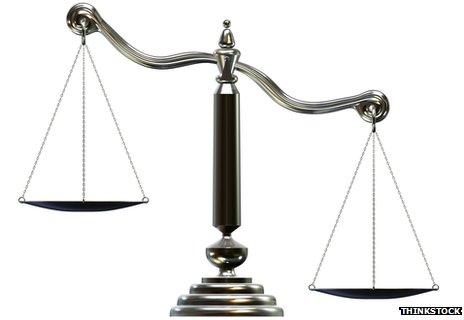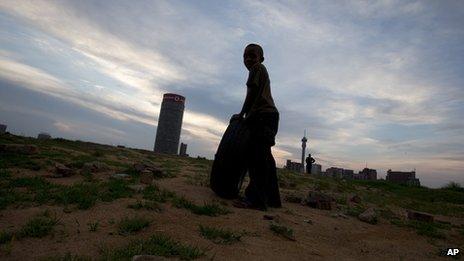Will inequality rise in this recovery?
- Published
- comments

Even in sclerotic Europe (well that's how we're seen by the Chinese), the global recovery is returning a bit of colour to the cheeks of the prone patient.
I won't labour the point about the UK's return to semi-respectable growth, although the Chancellor repeated his "it's-work-in-progress" message in a chat with 20 or so business leaders here in Davos this morning.
However, what George Osborne really wanted from them was that they should beat up the Labour leader for allegedly messing in a dangerous way in the energy and banking markets (although, incomprehensibly, I am told this wasn't a party political point).
And as it happens, Osborne repeated his denigration of the EU as chronically uncompetitive because of its excessive regulation and welfare bills that are high and rising (an analysis the Chinese share, as it happens).
But although the eurozone's revival lags chronically behind that of the US and UK, today's MARKIT survey of purchasing managers shows signs of life in the euro area - at last, some would say.
So here at the World Economic Forum there is growing confidence that it is safer than it has been for many years to take the kind of business risks that are the sine qua non of a sustained recovery.
Even the Iranian president, Hassan Rouhani, gave what would be called in the City and Wall Street "an investor presentation" - a not-very-subtle call to the world's most loaded investors, corporates and banks to invest in the Islamic republic.
The giant US bank Citi put numbers on the mood with this morning's forecast that global growth would rise from 2.5% last year to 3.3% this year.
So everything's tickety-boo again, and we can dismiss the 2008 crash as a bad dream?
Well not quite.
As you know (you do, you do), there is still a massive burden of debt and unfunded future welfare promises bearing down on the long-term growth prospects of most developed economies, including the UK.
And the other thing which really worries all the spectacularly wealthy people here is how they are becoming so much wealthier, minute by minute, than the world's poor.
Or at least that is what these plutocrats with a conscience say. How to tackle growing income inequality is one of the big themes of this year's World Economic Forum.
Strikingly, and importantly, the rising inequality is between individuals everywhere, whether in the US, UK, Africa or China.
And it is happening even as the gap between the incomes of nations narrows. According to the IMF, for example, the GDP of African nations collectively will rise faster this year than that of almost any other region.
But even in Africa, a disproportionate share of the fruits accrue to a new class of billionaires and the mega-wealthy.
There are two conventional and contradictory theories of why inequality is so determinedly on the ascendant.
The version preferred by Davos Person is that in a world of globalised, easy-access capital and data, disproportionate rewards accrue to those with marginally greater talents.
You can see why they like this account - it implies their billions are their just desserts.

Poverty in South Africa: Inequality is a global issue
The other theory is that nepotism and closed networks rule (OK?) and that there is little equality of opportunity when it comes to access to education and capital, so a smallish cadre of the privileged reinforce their privileges through the generations.
However, in a way, it doesn't matter which theory you sign up for. At least part of the prescription to roll back the tide of inequality would be the same on both diagnoses - better education for all, better access to affordable finance for all.
Which is neither controversial or desperately original, although that somehow doesn't mean we are galloping towards an egalitarian future.
And by the way, the fashionable theory here is that technology means that any of us who haven't already made our billions are knackered anyway.
The big chatter here is about the current acceleration in the refinement of artificial intelligence and robotics, which will allegedly see 80% of even quite high-skilled jobs replaced by machines within years.
Which would mean that redundancy looms for all jobs that aren't either desperately menial or creative in a sense that robots can't replicate.
You will be OK if you are a stand-up comedian, and (apparently) it is unlikely it will be cheaper to have a robot clean a bathroom than a human. But many accountants and software engineers, inter alia, should probably fret.
Consider yourself warned.